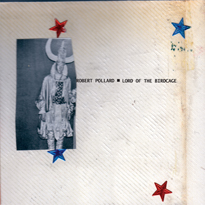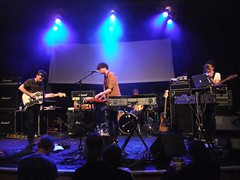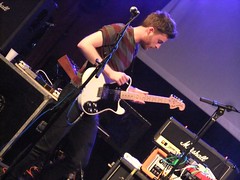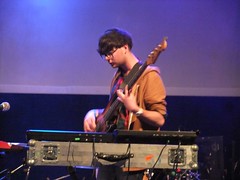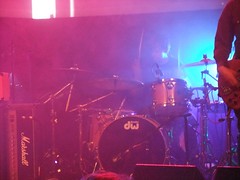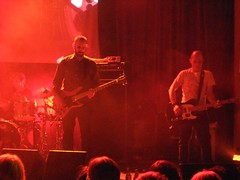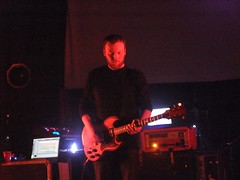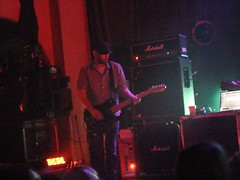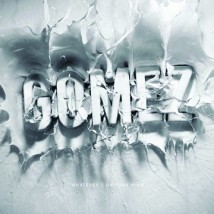12 May 2011 (Aggie Theatre, Ft. Collins CO)Ft. Collins welcomed an invasion from the Pacific Northwest. Portland's Portugal. The Man brought Telekenesis (from Seattle) and Unknown Mortal Orchestra (from Portland) to open for them. Despite sharing a regional background, each band offered their own flavor of show, from musical sound to on-stage experience. The Aggie's enthusiastic crowd embraced all the acts.
All three bands are playing Friday and Saturday at the Bluebird Theater in Denver, so if you missed the show, head to Denver to see them there.
Unknown Mortal Orchestra

Three piece
Unknown Mortal Orchestra had a tight indie rock/experimental sound that belied their casual stage presence. They were stylistically variable, with some songs reflecting a pop vocal element, while the music was less focused. Sometimes garage rock oriented, other times they took on a looser, experimental approach.

In general, the band reminded me most of Pavement: throbbing bass and psychedelic guitar dissonance spread over a driving beat. Angular riffs and odd breaks kept things interesting. They also pulled out some Beck-style speedy, discordant funk and some vaguely jazzy interludes to break up their songs.

Visually, the band had a laid back feel -- they moved around a bit, but everybody kept to their own patch of stage. The guitarist's slap technique was original and eye catching. The drummer's clear, plexi kit had a cool look, as it was almost invisible.
I really enjoyed their set. It stayed engaging even as it kept me guessing. Unknown Mortal Orchestra had a full sound that seemed larger than a simple three piece group. They mentioned they have an album coming out in the next month or two. I'll be interested in hearing what their studio work is like.
Telekinesis

If Unknown Mortal Orchestra had a stronger sound than their show,
Telekinesis flipped that around. Another three piece, they had a phenomenal punk style stage presence. The bass player looked like he's studied Dee Dee Ramone. He'd hold defiant poses then pogo bounce or stalk the stage.

The guitar player also followed the punk tradition, albeit more like the Clash's Joe Strummer. He worked the crowd, coming out to the lip of the stage interacting directly. He was also the one to goad the audience into clapping along.
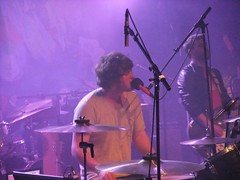
In a twist, the drummer was the lead singer, but that never interfered with his playing. With his hands and feet busy playing, he milked the most out of facial expressions and body language. All together, the band was a great visual show. On appearance alone, they drove the music forward and held the audience.
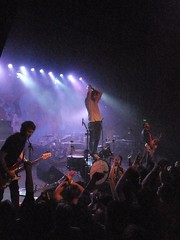
Telekinesis' music wasn't as edgy as Unknown Mortal Orchestra, but their straightforward alt rock jams had a strong Replacements-style raw energy. Swells of feedback, solid busy bass lines, and kick-out-the-jams drumming all fell together in a tight mix. By turns punk, garage rock, indie, and pop punk, the music was fun and the memorable stage show took it over the top.
They had a few tricks as they worked in some false endings and sharp dynamics that started soft and suddenly drove into a hard rock pounding. One of my favorite songs in their set,
Car Crash, showed off their dynamics, shifting from a indie rock to punk punch, then back for the turnarounds.
Portugal. The Man
 Portugal. The Man
Portugal. The Man started off their set with a video for
Sleep Forever, from their upcoming album
In the Mountain, In the Cloud. The relaxed jam and gradual build got the crowd hyped. Where
Sleep Forever ends, the video continued, turning strange and foreboding and shifting into
Got It All (This Can't Be Living Now). The 'punchline' to the video caught us all by surprise.
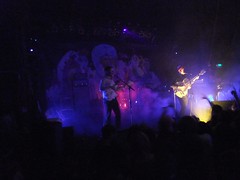
When the video wrapped up, fog poured over the stage and the band came out. A long swell of resonant guitar set a trippy mood before the drums kicked in and started a dark grinding beat. The set was full of retro sounding, heady rock jams. Coming from somewhere between My Morning Jacket and Flaming Lips on the compass, Portugal. The Man also evoked in some of Blue Öyster Cult's threatening darkness. The busy, snaking bass lines covered with meandering guitar distortion carried the evening.

John Gourley's falsetto vocals occasionally drifted towards Robert Plant, but usually reminded me more of John Lennon's work with the Plastic Ono Band, especially on the more Beatlesque grooves. His voice serves as an anchor as the songs swirl some soul, blues, funk, and even ska into their psycho-classic rock foundation.

The lighting was a vital factor in the show -- they never used the overhead spots for the entire set. There was floor lighting, a nice set of lasers in various colors, and strobes, so the band stayed mostly in the shadows. The light show effects added an acid test touch and kept the focus more on the music than the band. Gourley was pretty much the only visible player for much of the time. The lighting was cool, but made photography difficult.
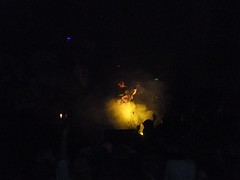
More photos on my
Flickr.
 If 2008's Evil Urges signaled a change of direction for My Morning Jacket, Cicuital continues the band's evolution through further regression. The buzz around Circuital has focused on the band reinvigorating themselves and getting back to their roots. But My Morning Jacket is not revisiting the sound of their earlier albums so much as mining a blend of retro sounds. True to their ambivalence to genre, the sounds on this album wander through soundtrack moments, psychedelic jams, and ballads. In addition to the classic tone, Jim James and the band fill Circuital with a soulful vibe.
If 2008's Evil Urges signaled a change of direction for My Morning Jacket, Cicuital continues the band's evolution through further regression. The buzz around Circuital has focused on the band reinvigorating themselves and getting back to their roots. But My Morning Jacket is not revisiting the sound of their earlier albums so much as mining a blend of retro sounds. True to their ambivalence to genre, the sounds on this album wander through soundtrack moments, psychedelic jams, and ballads. In addition to the classic tone, Jim James and the band fill Circuital with a soulful vibe.




